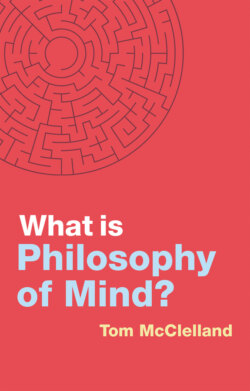Читать книгу What is Philosophy of Mind? - Tom McClelland - Страница 13
1.4.3 The Distribution Question
ОглавлениеThere are lots of things in the world, but which of them have minds? If you’re watching the football game, you’ll be pretty sure about the distribution of minds. You’ll be confident that Mindy, the goalkeeper and the referee each has a mind. You’ll also be confident that the ball, the goalposts and the referee’s whistle don’t have minds. But is this confidence well founded? And in many circumstances we’re not so confident about the distribution of minds. Does a newborn baby have a mind? What about a foetus, or a zygote? Does your pet cat have a mind? What about a bat, a bee or an octopus? Should we attribute minds to trees, to plants or to viruses? Could there ever be an AI with its own mind? What about the internet, a smartphone or a self-driving car? Might it be that everything has a certain level of mindedness and that mentality pervades the universe? Or might it be that nothing does and that the whole idea of minds is a myth?
Once we’ve decided which things have minds, there remains the further question of what kind of mind they have. If a foetus has a mind, is it a conscious mind or a mind populated only by unconscious mental states? If an octopus has a mind, is it a rational mind like ours or a bundle of instinctive mental processes? If a self-driving car has a mind, is it an emotional mind with feelings of love and hate or is it emotionally inert? Besides asking these general questions about the distribution of consciousness, rationality and emotion, we can ask some more specific questions about the distribution of specific mental state types. For instance, which of these beings can feel pain and which cannot?
The Distribution Question has an epistemological aspect. How do we know whether something has a mind or what kind of mind it has? What criteria should we be applying and how confidently can we apply them? It also has a metaphysical aspect. What does it take for something to have a mind? What does it take for that mind to be rational, conscious or emotional? Does it involve something immaterial or is it a case of having the right physical properties? Could something without a biological brain have a mind? Could something without a physical body have a mind?
Our answer to the Distribution Question has enormous implications for how we interact with the people, creatures and artefacts around us. If we learn that the goalkeeper doesn’t really have a mind, then how we treat her would immediately change. It would alter our expectations of her, the duties we feel towards her and the rights we attribute to her. Whether something has a mind can be a deciding factor in whether it deserves our moral consideration. The question of when a developing infant acquires a mind has great ethical import. Well into the 1970s, it was routine to give babies surgical procedures without anaesthetic. Why? Because the surgeons thought that babies hadn’t yet developed minds capable of suffering so there was no need to risk giving them anaesthetic. It looks like the surgeons were making a huge ethical mistake here, and this mistake was built on their erroneous answer to the Distribution Question.
Something similar applies to our treatment of non-human organisms. You needn’t feel guilty about standing on a daisy because you don’t think that daisies have minds, but you ought to feel guilty about standing on a cat. So in order to treat organisms the right way, we really ought to know where in the tree of life minds start to emerge. AI stretches our moral imagination even further. You wouldn’t feel guilty about sending a self-driving car to the scrap-heap, but is your indifference justified? One problem here is that we tend to be on the lookout for minds like ours. Could daisies or cars have minds that we fail to recognize because they’re so totally unlike our own? And once we consider the possibility of completely different kinds of mind, the field of possible minds gets even broader. Maybe molecules have minds. Maybe planets do. Maybe the universe as a whole forms a vast ‘über-mind’ of which we are all a part. If any of these possibilities are true, it could completely change how we act.
